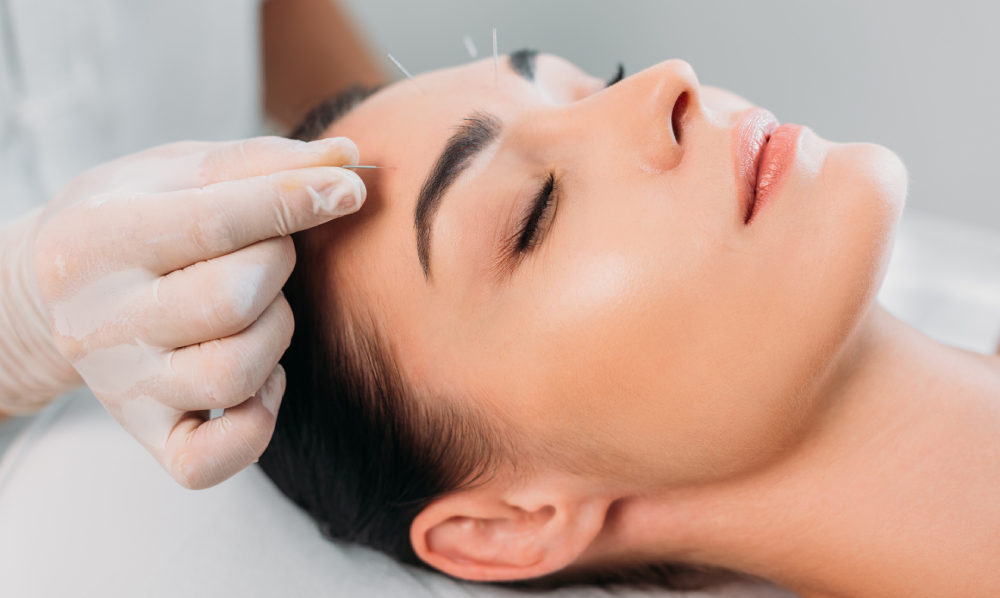What Is Cosmetic Acupuncture?
Cosmetic acupuncture, often referred to as facial acupuncture, is a specialized practice within traditional Chinese medicine. This technique focuses on enhancing skin health and addressing aesthetic concerns by harnessing the principles of acupuncture. Let’s delve into the details of cosmetic acupuncture:
- Understanding Cosmetic Acupuncture
- Concept: Based on traditional acupuncture, it targets specific points on the face to improve skin appearance and overall wellness.
- Mechanism: Believed to stimulate collagen production, enhance circulation, and promote relaxation, leading to rejuvenation of the skin.
- Holistic Approach: Often combined with other Chinese medicine practices to address underlying health issues affecting skin appearance.
- The Therapy Process
- Initial Assessment: A comprehensive evaluation of the individual’s health, lifestyle, and skincare concerns.
- Treatment Plan: Tailored to address specific cosmetic goals, such as reducing wrinkles, improving skin tone, or decreasing puffiness.
- Technique: Involves inserting very fine, sterile needles into specific acupuncture points on the face.
- Procedure and Techniques
- Needle Insertion: Tiny needles are inserted into targeted facial areas and left in place for a specific duration.
- Combination Treatments: These may include herbal supplements, dietary advice, and facial massage or Gua Sha.
- Session Frequency: Typically involves a series of sessions, often with recommendations for maintenance treatments.
- Benefits of Cosmetic Acupuncture
- Skin Health: Can improve complexion, reduce acne, and diminish signs of aging.
- Natural Approach: Offers a less invasive alternative to surgical procedures or injections.
- Relaxation Benefits: The process can be quite relaxing, similar to a traditional acupuncture session.
- Whole-Body Wellness: Addresses underlying health factors that contribute to skin health.
- Risks and Side Effects
- Mild Bruising or Redness: At the needle insertion sites.
- Sensitivity: Some may experience mild discomfort during the procedure.
- Allergic Reactions: Rare but possible reactions to needles or adjunct treatments.
- Who Should Be Cautious
- Those with Skin Conditions: Such as severe acne or eczema.
- Pregnant Women: Certain acupuncture points are avoided during pregnancy.
- Those with Blood Disorders: Like hemophilia or individuals on blood thinners.
- Finding a Qualified Practitioner
- Specialized Training: Seek practitioners specifically trained in cosmetic acupuncture.
- Experience: Experienced practitioners can provide more effective and safer treatments.
- Consultation: A good practitioner should offer an initial consultation to discuss goals and concerns.
- Resources: Websites like BestAcupuncturistOC.com help find qualified practitioners and provide detailed profiles and reviews.
- Conclusion
Cosmetic acupuncture presents a unique, holistic approach to skincare and anti-aging, blending ancient Chinese medicine techniques with modern aesthetic concerns. It’s essential to approach this treatment cautiously and consult a qualified practitioner. Platforms like BestAcupuncturistOC.com can be invaluable resources for locating experienced professionals in this field.
This detailed overview of cosmetic acupuncture covers its methodology, benefits, potential risks, and the importance of professional guidance, underscoring the holistic nature of this aesthetic treatment.
Conditions Treated
- Pain Conditions: Musculoskeletal Pain (back, neck, knee, shoulder, elbow, etc.), Arthritis, Migraines, Headaches, Sports Injuries, Fibromyalgia, TMJ, Post-Operative Recovery, Nervous System Disorders.
- Respiratory Disorders: Asthma, Allergies, Sinus Problems.
- Gastrointestinal Disorders: Irritable Bowel Syndrome, Food Allergies, Ulcers, Gastritis, Acid Reflux, Indigestion, Constipation/Diarrhea.
- Women’s Health: Infertility, PMS, Menstrual Irregularities, Endometriosis, Poly Cystic Ovarian Syndrome, Menopause, Hormonal Imbalances, Pregnancy Conditions, Postpartum, Reproductive Disorders, Breech Baby.
- Men’s Health: Incontinence, Reproductive Disorders, Prostate Problems.
- Children’s Health: Coughs, Colic, Allergies, ADD/ADHD, Sleep Disorders, Digestive Problems, Fever/Flu/Colds, Stomach Aches/Nausea, Headaches, Bed Wetting.
- Addictions: Smoking, Cravings, Drug, Alcohol.
- Mental/Emotional: Depression, Anxiety, Insomnia, Sleep Disturbances, Stress.


